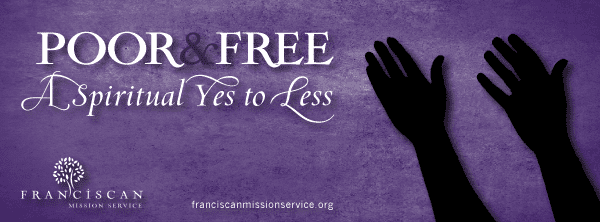Poor and Free: “Beyond Detachment”

Franciscan Mission Service presents:
“Poor and Free: A Spiritual Yes to Less” every Friday in Lent
Series contributions:
- Shane Claiborne: Part I, Part II, and Part III
- Gigi Gruenke: “Invest in God’s Dream”
- Jack Jezreel: “The Simple Math of Voluntary Simplicity”
- Amy Echeverria: “Saying ‘Yes’ to Love”
- Sr. Marie Lucey (OSF): “Faith Keeps Hope Alive”
- Marie Dennis: “Beyond Detachment”
- Fr. Martin Day, OFM Conv.: “Letting Go of Lent”
Marie Dennis has several ties to Franciscan Mission Service, including past involvement with Maryknoll organizations and current involvement with Pax Christi International. In 2007, we presented her with the Anselm Moons Award. She also was a Souposium speaker and facilitated our returned missioner retreat in 2013. In this installment of our Lenten series, “Poor and Free: A Spiritual Yes to Less”, Marie addresses the nuances and complexities of responding to social injustices with generosity and joy.
Your work has called into question the ethics of just-war theory. In free-market capitalist democracy, how is it possible for Christians to translate spiritual poverty into public policy?
Actually, I believe that spiritual poverty (Blessed are the poor in spirit …) is much more challenging than we are led to believe. Spiritual poverty moves us beyond “detachment” from the material possessions that we continue to accumulate toward real simplicity of lifestyle and – most importantly – into relationship with those who are impoverished in order to interpret reality from their perspective.
From that vantage point, we can begin to evaluate laws or public policy proposals and business or consumer practices by how they affect people who are poor and we can work with impoverished people to change the structures and transform the systems that create or perpetuate poverty.
 |
| “The values and priorities of the Gospel have to inform decisions in the public arena” |
What is your response to a woman or man in a position of political authority who states that their Christianity is a private matter not necessarily conflicting with aggressive geopolitical stances or domestic policies indifferent to the marginalized?
The responsibility of elected or appointed officials in a pluralistic society is very complex. Their personal faith will, hopefully, have a significant impact on their own values and integrity as a human being, which should be evident when they are running for office or being considered for appointment.
However, Christianity is not only about personal morality. Jesus’ powerful preaching and witness in the context of first century Palestine made evident that his invitation was also to discipleship in the public sphere. He emphasized over and over again the privileged place of impoverished and excluded peoples; the great need for compassion; the centrality to the discipleship journey of the work for social justice or righteousness; and the call to peacemaking and reconciliation.
Those are political tasks. The values and priorities of the Gospel have to inform decisions in the public arena – of both ordinary citizens and political authorities, but careful discernment about specific programs or policies will still be required as we struggle to apply these values to particular situations in our own times.
Is spiritual poverty the ultimate antidote to war and violence?
That depends on how you understand spiritual poverty. To be poor in spirit we have to shape our lives and futures from the standpoint and for the sake of those who are poor and, as we are slowly learning, in harmony with the integrity of creation.
That implies that spiritual poverty would be manifest in right relationships with the whole earth community (that includes humans), which moves in the direction of shalom – something much deeper and wider than the absence of war. Jesus’ Sermon on the Mount, including his “hard sayings” (“love your enemy,” “turn the other cheek,” “you cannot serve both God and money,” “forgive”), offer a beautiful and comprehensive map for his disciples – and a powerful antidote to war and violence.
 |
| Blessed are those who “live simply so that others may simply live”(Mohandas Gandhi) |
Despite the war and destruction in the world, Pax Christi’s message of peace is very positive. How does spiritual poverty figure into the joy of faith in Christ?
Blessed (often translated as “happy”) are the poor, for they shall be called children of God… Blessed are the poor in spirit, for theirs is the kingdom of heaven. One of the clearest measures of beatitude (or ultimate happiness) is poverty — poverty that is both real and relational. Blessed are the poor themselves and blessed are the poor in spirit.
Blessed are the “throw-away” people, the survivors, the unemployed. Blessed are the migrants and the immigrants, the tortured, the violated. Blessed are all the people who are struggling to survive, to find a decent quality of life — and blessed are those who “live simply so that others may simply live”(Gandhi). Deep joy flows abundantly from following the Beatitudes’ counter-cultural roadmap.
You are the first woman to hold your leadership position at Pax Christi. How does spiritual poverty include detachment from prejudices, opening people’s minds and hearts to the conversations with women that build relationships and just inclusivity?
To be poor in spirit, we have to believe in the equal dignity of every person in the eyes of God and act accordingly. That includes women. Jesus’ message about inclusive community was very clear and he repeated it often, in spite of the fact that it regularly got him in trouble and probably led to the Cross.
The obstacles to justice for women are many – from personal prejudices to systemic and structural barriers. The right relationships that flow from real poverty of spirit take hard work at many levels of life, regular practice and patience. But they are possible if we transform habits of exclusion both personally and politically.
Marie Dennis is co-President of Pax Christi International with South African Bishop Kevin Dowling. She is also a Pax Christi USA Ambassador of Peace and contributing editor of Sojourners. She is author or co-author of seven books, including Diversity of Vocations (2008). She has also been involved with the White House Task Force on Global Poverty and Development, Catholic Peacebuilding Network, and Jubilee USA Network.
Tagged in:


